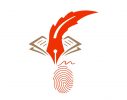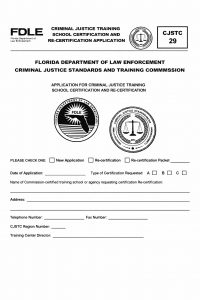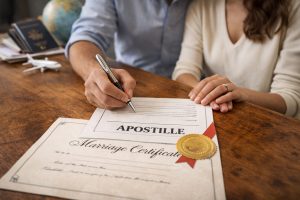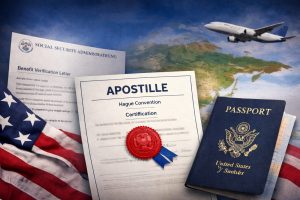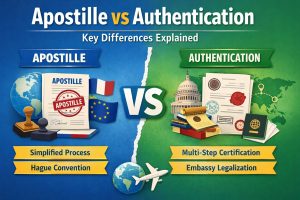If you’re dealing with important documents that need authentication, you’ve probably come across both terms: notary and apostille. While they sound similar and sometimes work together, they serve completely different purposes. Understanding the distinction can save you time, money and a lot of confusion.
If you’re trying to find a notary public or figure out whether you need an apostille instead, understanding the difference is essential. Let’s break down what each one does, when you need them and how they work in Florida.
What Does a Notary Actually Do?
A notary public is someone your state authorizes to witness document signings and verify who people are. Think of them as that impartial friend who makes sure everything’s legit, confirming you’re actually you and that you’re signing documents because you want to, not because someone’s forcing you.
Here in Florida, notaries deal with everyday stuff like:
- Real estate deeds and mortgages
- Power of attorney forms
- Affidavits and sworn statements
- Loan documents
- Business contracts
The notary’s job is pretty straightforward but really important. They’ll check your ID, watch you sign the document and then stamp it with their official seal. It’s a simple process that adds credibility and helps stop fraud in its tracks.
But here’s where it gets tricky: that notarized document? It’s only valid here in the United States. If you need to use it internationally, notarization alone won’t get you there.
So What’s an Apostille?
An apostille is basically a special certificate that gives your notarized document international street cred. It’s that extra layer of authentication foreign governments actually recognize and accept.
The term “apostille” comes from an agreement back in 1961 called the Hague Convention. Over 120 countries signed on, which made the whole process of using documents across borders way less complicated. Before this treaty, getting your documents recognized internationally meant jumping through hoops at embassies and consulates.
Here’s what you should know about apostilles:
- In Florida, only the Secretary of State can issue them
- Your document needs to be notarized first (with a few rare exceptions)
- They only work for countries that signed the Hague Convention
- If you’re dealing with a country that didn’t sign the treaty, you’ll need something called authentication instead
The Real Difference Between Notary and Apostille
Here’s where people get confused. A notary and an apostille aren’t competing services. They work together in a specific order.
The notary verifies your signature and identity on the document. The apostille then verifies the notary’s authority and makes that document acceptable internationally.
Think of it like this: notarization is the first checkpoint and the apostille is the international passport for your document.
You can’t get an apostille without proper notarization first. And if you’re only using a document within the U.S., you don’t need an apostille at all.
When Do You Need Each One?
You need notarization when:
- Buying or selling property in Florida
- Creating a power of attorney
- Signing loan documents
- Filing legal affidavits
- Executing business agreements
Getting documents notarized in Florida is straightforward. Mobile notaries can even come to your home or office, which saves you the hassle of driving around looking for a notary.
You need an apostille when:
- Moving to another country
- Getting married abroad
- Studying at a foreign university
- Doing business internationally
- Adopting a child from overseas
- Applying for dual citizenship
Common documents that need apostilles include birth certificates, marriage licenses, divorce decrees, diplomas, FBI background checks and corporate documents.
The Florida Apostille Process
Getting an apostille in Florida involves two main steps. First, your document needs to be properly notarized. Second, you submit it to the Florida Secretary of State’s Division of Corporations in Tallahassee.
The state office verifies the notary’s commission and then attaches the apostille certificate to your document. This usually takes about five business days if you mail it in, though processing times can vary.
Many people find the apostille process confusing because different documents have different requirements. Birth certificates, for example, need certified copies from the Bureau of Vital Statistics signed by the State Registrar. Regular notarized copies won’t work.
Professional apostille services can handle this entire process for you, often getting it done in 24 hours by submitting documents in person to the state office. This beats waiting in line yourself or dealing with potential rejections due to incorrect notarization.
What About Countries Outside the Hague Convention?
Not every country signed the Hague Convention. China, Canada and several Middle Eastern countries require a different process called authentication or legalization.
For these countries, your notarized document goes to the Florida Secretary of State for a Certificate of Notarial Authority, then to the U.S. Department of State in Washington D.C. and finally to that country’s embassy or consulate.
It’s a longer process with more steps. If you’re dealing with a non-Hague country, you’ll want to check their specific requirements early.
Common Mistakes People Make
The biggest mistake is waiting until the last minute. If you’re traveling abroad or handling international business, start the authentication process at least two weeks before you need the documents.
Another common error is getting documents notarized incorrectly. Florida has strict rules about notarial certificates. If the notarization doesn’t meet state standards, the Secretary of State will reject your apostille request. Working with a certified notary signing agent helps avoid costly mistakes and delays.
Getting Help with Notary and Apostille Services
Understanding the difference between notarization and apostilles is one thing. Actually getting through the process? That’s a whole different story.
If you need dependable notary or apostille help in South Florida, we’re here at Notary Plus More to make the whole thing easy and painless for you.
